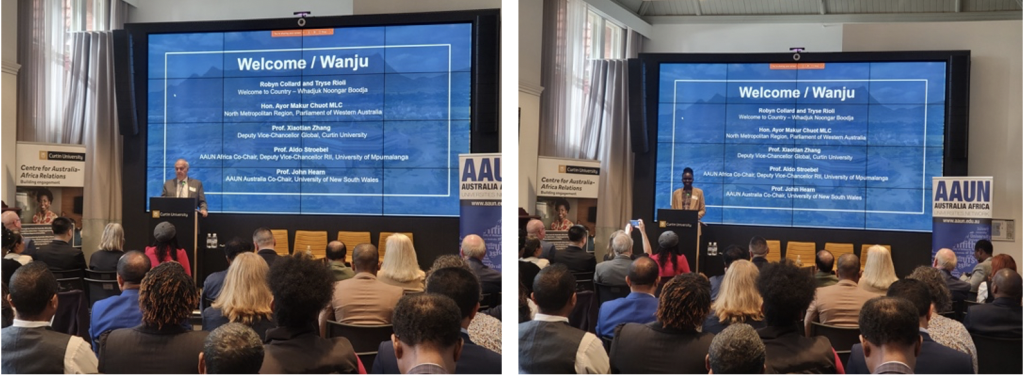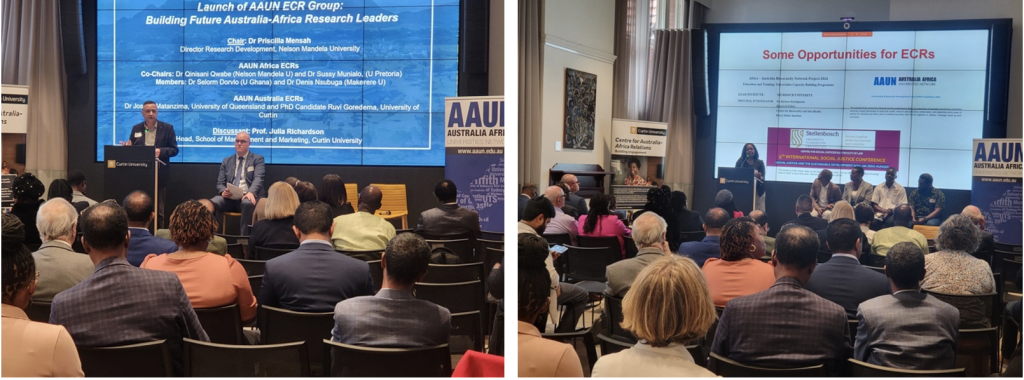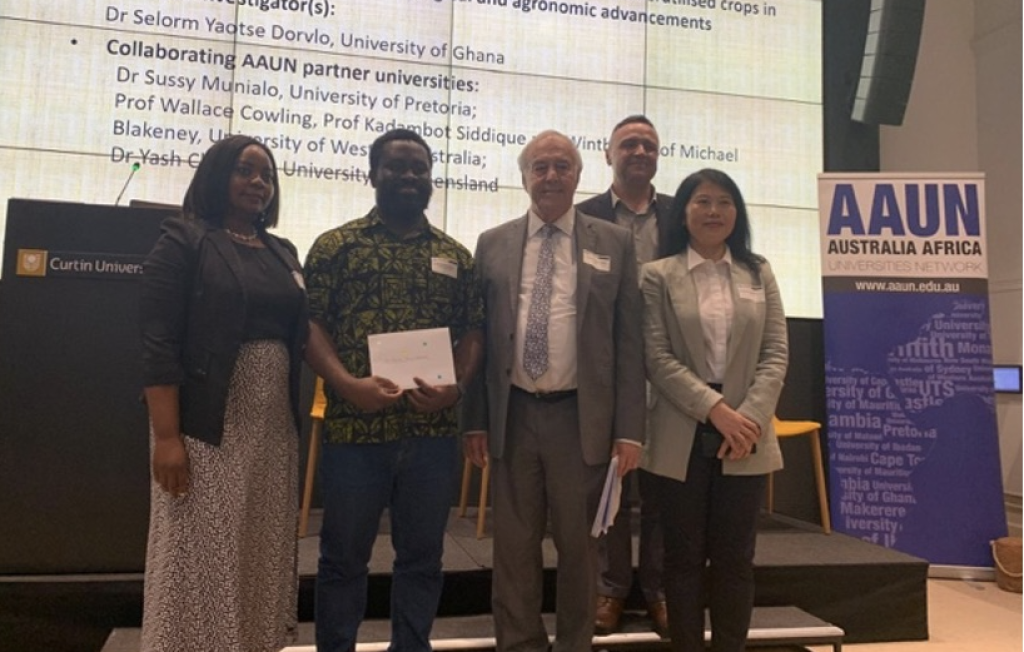Bridging Continents: Strategies for a Just Energy Transition at the AAUN Annual Forum

The AAUN annual Australia Forum held on 3 September 2024 during Australia Africa Week in Perth focused on the critical theme of The Just Energy Transition. This event aimed to explore the rationale, priorities, and implementation strategies for AAUN Partnerships. Participants delved into discussions on sustainable energy practices and equitable policies that benefit both Australia and African nations.
The Forum highlighted significant opportunities for positive change in alignment with the Sustainable Development Goals and the future of Africa-Australia relations. The event focused on exploring new pathways for joint research initiatives, capacity building, and cross-continental partnerships to advance sustainable development. It attracted a diverse audience, including academics, diplomats, government representatives, early career researchers, and business leaders from both Australia and Africa, with strong participation from the African delegation.
The first day featured parallel workshops on open science, university transformation, indigenous knowledge, and the future of Africa-Australia relations. The second day consisted of the main forum, which addressed topical issues through five sessions:
- the Just Energy Transition
- Security and Development in Africa and Australia
- the Science of Energy Transition
- the Politics of Energy Transition
- the Economics of Energy Transition
The event concluded with the launch of the AAUN Early Career Researchers Network and the announcement of the “John Hearn-Cheryl de la Rey Annual AAUN ECR Prize” honouring the AAUN co-founders, along with the awarding of PRDF grants.
Highlights of the Forum Sessions
Welcome Session Overview

The welcome session was hosted by AAUN Executive Co-Chair, Prof John Hearn, who delivered the opening address. Hon. Ayor Makur Chuot MLC, Member for North Metropolitan Region, WA Parliament; Prof Xiaotian Zhang, DVC Global at Curtin University; and Prof Aldo Stroebel, Co-Chair AAUN Africa and DVC Research, Innovation and Internationalisation at the University of Mpumalanga also offered welcoming remarks. The speakers underscored the significance of partnerships and collaboration in addressing global challenges.

Prof Xiaotian Zhang highlighted that AAUN has engaged in diverse partnerships spanning disciplines such as health and sustainable energy. Emphasizing the theme “The Just Energy Transition” Prof Zhang explained that this focus aligns with global initiatives like the Sustainable Development Goals and aims to foster future partnerships.
Prof Aldo Stroebel noted that the current theme, combined with the previous focus on “Sustainability” during the Africa Forum, sets a forward-looking trajectory centred on innovation. The importance of the PRDF awards was particularly noted for their role in supporting larger projects and early career researchers.
“The future of AAUN looks promising” Prof John Hearn stated. Investment in student exchange programs, collaborations and opportunities for innovation, as well as increasing representation of marginalized communities, women and youth, were identified as key prospects for the network’s growth.
Speakers emphasized the importance of the Africa-Australia relationship, highlighting its long-term development in education, digital energy, and humanitarian systems.
“The relationship between Africa and Australia is broad and dynamic; I am thankful for the Australia-Mauritius campus” remarked HE Kate Chamley, Australian High Commissioner to Mauritius.
Prof Barnabas Nawangwe, AAUN Africa Deputy Co-Chair and Vice-Chancellor of Makerere University, reflected on the historical ties, noting that the relationship dates back to independence when the first African scholars were welcomed to Australia. With Africa facing significant challenges such as climate change and deforestation, the workshop theme “The Just Energy Transition” was recognized as a critical shift towards alternative energy sources to address these pressing issues.
“Investing in green energy could lead to socio-economic transformation for both continents,” stated Dr Thandi Mgwebi, Group Executive: Business Advancement at the South African National Research Foundation. She emphasized that this transition must consider environmental sustainability, job creation, and equity.
Prof Matthew Neuhaus from the College of Law at Australian National University noted that common security challenges between Africa and Australia require mutually supportive engagement. Emerging areas of interest were also discussed, including marine science, which necessitates the development of mutually beneficial programs. While mining presents opportunities for economic growth, a disconnect in production from global supply chains hampers job creation. The AAUN was urged to intensify research and foster partnerships for innovation in value addition, requiring support from the international community, technological advancements, policy integration, and collaborative efforts between industry and academia.
The Science, Politics, and Economics of the Just Energy Transition

The science of the Just Energy Transition encompasses critical areas such as agriculture, engineering, waste management, gender inclusivity, and job creation. Prof Kadambot Siddique, Director of the UWA Institute of Agriculture, highlighted sustainable agricultural practices like on-farm greenhouses, carbon farming, revegetation, and efficient fertilizer use as vital for supporting this transition. “These practices should be bolstered by collaborative efforts, incentives, climate policies, marketing, advocacy, and traditional knowledge. There’s significant potential to reduce emissions and contribute to net-zero goals through actions at both the farmer and government levels” he noted.
The political aspect of the Just Energy Transition focuses on who participates in and benefits from mineral extraction and usage. Prof Christopher Isike, Director of the African Centre for the Study of the United States at the University of Pretoria, emphasized that the transition is complex, involving both the sustainable use of green energy and continued reliance on fossil fuels.
Economically, the energy transition is closely linked to job creation. Testing models for energy transition, such as the green energy initiatives in South Africa, was deemed essential. Financial sustainability—considering profitability, environmental impact, and community well-being—was highlighted as a key component. Prof Margaret Chitiga-Mabugu, Dean of the Faculty of Economics and Management Sciences at the University of Pretoria, stressed the importance of a gradual, rather than abrupt, transition: “We need to transition sequentially; we don’t stop, we do it strategically.”
Launch of the AAUN ECR Group: Building Future Australia-Africa Research Leaders

Introducing the session, Dr Priscilla Mensah acknowledged the leadership of Co-chairs Dr Qinisani Qwabe and Dr Sussy Munialo in supporting the AAUN Early Career Researchers (ECR) Network. “The ECR Network provides a unique opportunity to gain invaluable experience and develop extraordinary skills” she noted. “The Network serves as a platform for knowledge sharing, collaboration, networking and mentorship for Early Career Researchers” Dr Qwabe stated. ECR members expressed gratitude for the mentorship opportunities afforded by their involvement in the AAUN-ECR Network.
The establishment of a larger ECR Network encompassing both Africa and Australia was recognized as a significant opportunity for AAUN’s future. “The ECR Network is a crucial development within AAUN for building future leaders who will drive the Network forward” remarked Prof David Mickler.
Launch of the “John Hearn-Cheryl de la Rey Annual AAUN ECR Prize”

The Launch of the Annual AAUN ECR Prize is to recognise and honour the AAUN Co-founders Prof John Hearn and Prof Cheryl de la Rey for their contributions to the AAUN network. This annual award will be presented to the best-performing ECR during the AAUN Forum events.
Prof John Hearn expressed his gratitude for the recognition, stating “I am truly honoured and look forward to the growth of the ECR Network and the future of Australia-Africa relations.”
He stated the AAUN was founded in 2012 and the network is a platform for Australia and African Universities to work together. In the leading capacity, he has served to ensure the principles of equal partnership, quality of research and education programs, advancement of ECRs – women and men, and absolute integrity and trust of management and process.
Closing Session:
Announcement of PRDF 2024 Grant Winners

At the Forum Closing Session, the eight AAUN 2024 PRDF funded projects and winners were announced.
The AAUN Co-Chairs, Prof John Hearn and Prof Aldo Stroebel, congratulated the eight grant awardees of 2024 AAUN PRDF from both Africa and Australia, and presented the Award Letters to the grant winners.
Reflecting on the AAUN’s achievements, Prof Stroebel outlined key accomplishments: 68 PRDF grants have been awarded and successfully implemented; Early career researchers (ECRs) have been encouraged to participate in the research projects and the ECR Network has been established. He emphasized that the PRDF awards demonstrate AAUN’s commitment to supporting research and contributing to sustainable goals and global visions.
The Forum also welcomed three new members to the Network: Bahir Dar University in Ethiopia, Edith Cowan University in Australia, and Université Cheikh Anta Diop (UCAD) in Senegal. In their introductory remarks, Dr Mengesha Ayene Ejigu (Bahir), Prof Margaret Jones (Edith Cowan), and Prof Ahmadou Aly Mbaye (UCAD) expressed their commitment to actively participate in the Network.
Prof Kayihura Didas, Vice-Chancellor of Rwanda University, shared his enthusiasm for the growing AAUN Network and announced that the 2025 AAUN Africa Forum will take place at Rwanda University, inviting everyone to participate. The Future Africa conference at the University of Pretoria will follow the Rwanda meetings.
In closing the Forum, Prof John Hearn thanked all who had attended, travelled and contributed to another excellent Forum. On behalf of AAUN, he expressed deep thanks and appreciation to all who had joined in the network’s development since 2012. We have a successful, innovative and vibrant Australia Africa partnership, with major achievements and serious future potential. He thanked especially his Co-Chairs Cheryl de la Rey, Tawana Kupe and Aldo Stroebel; Deputy Co-Chairs Frans Swanepoel and David Mickler; and Grace Liu Flanagan – AAUN General Manager and Company Secretary.
